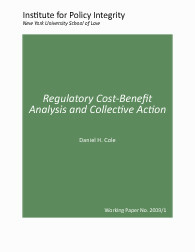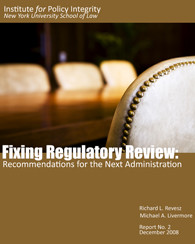-

Regulatory Cost-Benefit Analysis and Collective Action
In Regulatory Cost-Benefit Analysis and Collective Action, Daniel H. Cole describes the influence of cost-benefit analysis and explains how and why it is a politically useful tools for agencies, even when those agencies are not required by law to prepare regulatory cost-benefit analyses (RCBA). As Cole says in his introduction, “For better or for worse, RCBAs have significantly influenced policies for dealing with, or not dealing with, collective action problems ranging from airport enlargement to global climate change.”
-
_110_170_90.jpg)
Federalism Accountability
“Agency Forcing” Measures
In Federalism Accountability: “Agency Forcing” Measures, author Catherine M. Sharkey advocates a variety of “agency-forcing” measures designed to enhance the ability of Congress, the executive, and especially the courts to ensure that agencies abide by executive mandates and other reforms, and to provide a check on overt politicization or inaction on agencies’ part.
-
Request for cost-benefit analysis of Waxman-Markey bill
During the congressional debate over the climate legislation proposed by Reps. Waxman and Markey, the EPA published several costs estimates for the bill. But the agency was never asked to estimate the corresponding benefits.
-
Comments on New York state electricity subsidies
New York State subsidizes the electricity bills for some companies as a way of encouraging them to keep their business here.
-
Motion for leave against hazardous truck driver rules
In November 2008, just weeks before President Obama took office, the Bush Administration finalized a rule increasing the amount of time truck drivers can spend behind the wheel—creating a possible public health and safety hazard. The rule allows truck drivers to drive for 11 hours, one more hour than they were allowed before 2003, and allows them to drive as many as 77 hours in seven days or 88 hours in eight days, over 25 percent more than previously allowed by federal law.
-
Policy Integrity’s recommendations incorporated into EECA report
Today, Policy Integrity received favorable feedback on comments we submitted on draft EPA Guidelines for Preparing Economic Analyses supporting positive changes made in the new draft and suggest additional improvements. The document has been an influential resource for EPA’s consideration of regulatory costs and benefits.
-
Comments in support of the rescission of the Physician Conscience rule
With litigation pending by ACLU, Planned Parenthood, the State of Connecticut and six other states against the physician conscience rule, the new Obama Administration proposed a rescission of the rule. Policy Integrity joined the coalition to submit comments in support of that action.
-
Legal memorandum on stopping midnight regulations
Shortly after his inauguration, President Obama took steps to halt the adoption or implementation of regulations that went into the pipeline during the final days of the Bush Administration.
-

Fixing Regulatory Review
Recommendations for the Next Administration
Fixing Regulatory Review: Recommendations for the Next Administration provides a set of recommendations for the Obama Administration to improve the process of regulatory review. It includes ten principles that should inform regulatory review and cost-benefit analysis of regulation, as well as a detailed markup of the Executive Order signed by President William Jefferson Clinton that established the structure of review that is currently in place.
-
Comments on EPA’s Guidelines for Preparing Economic Analyses
In September 2008, EPA’s National Center for Environmental Economics released a new draft of its Guidelines for Preparing Economic Analyses. In the past, that document has not only been a key resource for EPA’s consideration of regulatory costs and benefits, but it has also influenced the analytical processes used by state agencies and other federal agencies.
Viewing recent projects in Government Transparency
